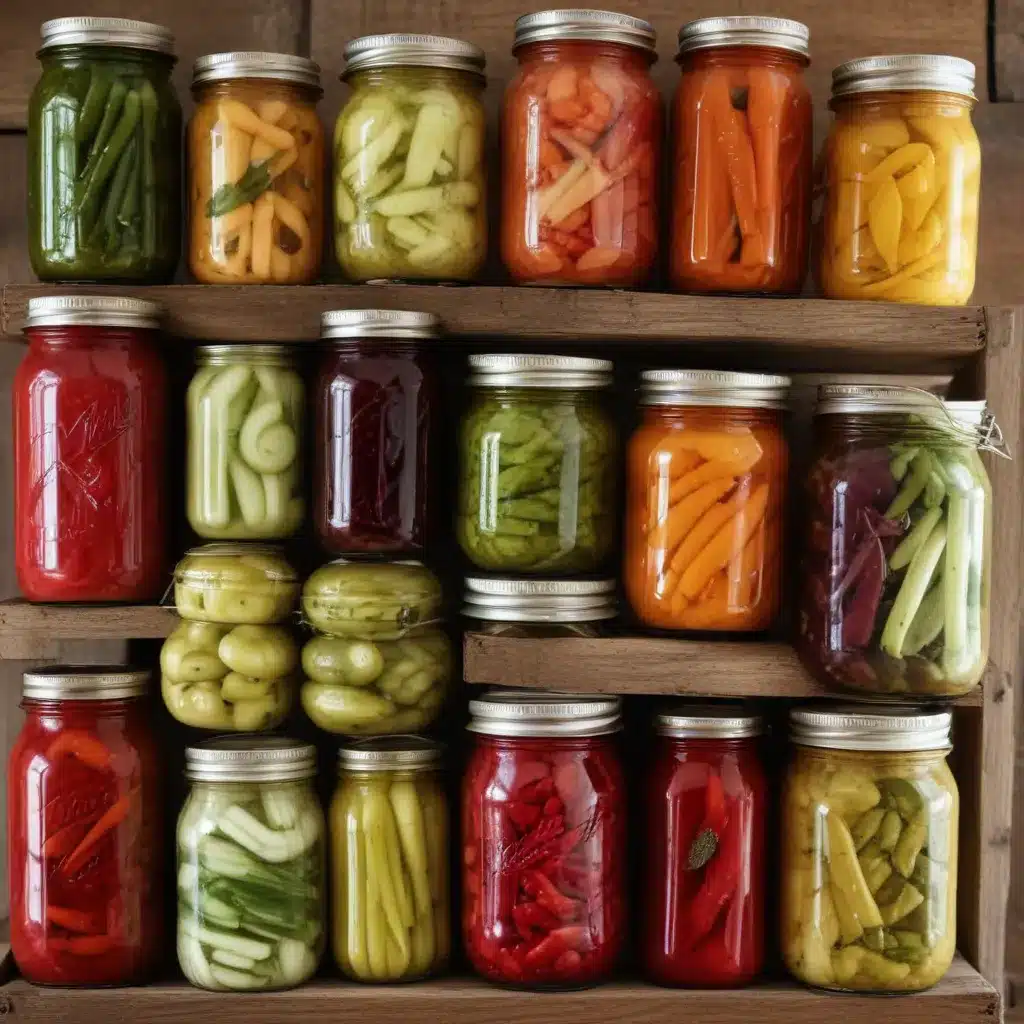
As the growing season reaches its peak, the bounty of fresh produce from the garden and orchard can feel both bountiful and overwhelming. Fortunately, there are a variety of time-tested preservation techniques that allow you to savor the flavors of summer all year round. Whether you prefer the crisp, tangy punch of pickles, the rich, soothing comfort of fermented vegetables, or the convenience of canned goods, Crooked Pines Farm has you covered.
Canning Techniques
Canning is one of the most versatile and long-lasting preservation methods, allowing you to safely store a wide variety of fruits, vegetables, meats, and more. The process involves heating jars of food to high temperatures, killing off any harmful microbes and creating an anaerobic environment that prevents spoilage.
Hot Water Bath Canning
For high-acid foods like tomatoes, fruits, jams, and pickles, the hot water bath canning method is a straightforward and efficient way to preserve your harvest. Simply fill sterilized jars with your prepared produce, cover with a hot vinegar or citric acid-based liquid, and process the sealed jars in a large pot of boiling water. This method is relatively quick and easy, making it a great introduction to home canning.
Pressure Canning
Low-acid foods like vegetables, meats, and soups require the use of a pressure canner to reach the higher temperatures necessary to destroy potentially dangerous bacteria. While the process is a bit more involved, pressure canning opens up a whole world of homemade canned goods, from green beans and corn to savory stews and sauces.
Safely Storing Canned Goods
Proper storage is key to ensuring the long-term safety and quality of your canned goods. Always check jars for any signs of spoilage, such as bulging lids, leaks, or off odors, before consuming. Ideally, canned foods should be kept in a cool, dark place, and used within 1-2 years for optimal flavor and nutrition.
Pickling Methods
Pickling is a time-honored tradition that transforms fresh produce into flavorful, shelf-stable delights. The process involves submerging vegetables or fruits in an acidic liquid, such as vinegar or a salt brine, to create an inhospitable environment for spoilage microbes.
Vinegar-Based Pickles
Vinegar-based pickles, also known as “quick pickles,” are perhaps the most familiar type. By simply packing your prepared produce into jars and covering them with a hot vinegar solution, you can enjoy crisp, tangy pickles in a matter of weeks. The high acidity of the vinegar is what prevents bacterial growth and ensures a long shelf life.
Salt Brine Pickles
For a more traditional approach, salt brine pickles rely on the natural fermentation process to create an acidic environment. By submerging vegetables in a salt-water solution, you encourage the growth of beneficial lactic acid bacteria, which gradually transform the sugars into lactic acid. This method often takes several weeks to fully ferment, but the resulting pickles can be stored for months in the refrigerator.
Fermented Pickles
Taking fermentation a step further, fermented pickles combine the benefits of both vinegar-based and salt brine methods. By allowing the natural fermentation to occur before adding vinegar, you end up with a delightfully complex flavor profile and a wealth of gut-healthy probiotics.
Fermentation Fundamentals
Fermentation is a fascinating process that has been used for centuries to preserve food and unlock new flavors. Through the power of beneficial microbes, you can transform a variety of fruits and vegetables into tangy, probiotic-rich delicacies.
Lacto-Fermentation
Lacto-fermentation is perhaps the most well-known form of fermentation, relying on lactic acid bacteria to break down the sugars in your produce. By submerging chopped or shredded vegetables in a salt brine, you create an anaerobic environment that allows these bacteria to thrive, producing lactic acid as a byproduct. This process results in flavorful, shelf-stable foods like sauerkraut, kimchi, and fermented pickles.
Kombucha and Kefir
Fermentation isn’t limited to just vegetables – you can also use it to create probiotic-rich beverages like kombucha and kefir. These drinks rely on a symbiotic culture of bacteria and yeast (SCOBY) to transform sweetened tea or milk into tangy, effervescent elixirs that are bursting with beneficial microbes.
Sauerkraut and Kimchi
Two of the most well-known fermented foods, sauerkraut and kimchi, showcase the transformative power of lacto-fermentation. By shredding cabbage and other vegetables, adding salt, and allowing the natural bacteria to work their magic, you can create a wealth of unique flavors and textures that will delight your taste buds.
Seasonal Preservation
No matter what’s in season, there’s always a delicious way to preserve the flavors of your Crooked Pines Farm harvest. From juicy summer tomatoes to crisp winter root vegetables, these techniques will have you enjoying the bounty of the land all year round.
Summer Produce
When the garden is bursting with ripe tomatoes, zucchini, and fresh herbs, it’s the perfect time to whip up batches of canned salsa, pickled vegetables, and fermented relishes. These vibrant, flavorful preserves will transport you back to the height of summer, even on the coldest winter day.
Fall Harvest
As the leaves start to turn, the autumn harvest brings a wealth of root vegetables, hardy greens, and juicy fruits. This is the ideal time to can applesauce, pumpkin puree, and diced root vegetables for hearty soups and stews. Don’t forget to ferment some sauerkraut or kimchi to enjoy with your seasonal meals.
Winter Storage
For those with limited growing seasons, proper storage techniques can help extend the life of your homegrown produce well into the winter months. Root cellaring, dehydrating, and canning are all effective ways to enjoy the harvest long after the growing season has ended.
No matter which preservation methods you choose, the team at Crooked Pines Farm is here to support your journey towards self-reliance and food security. By harnessing the power of canning, pickling, and fermentation, you can savor the flavors of the land throughout the entire year.


